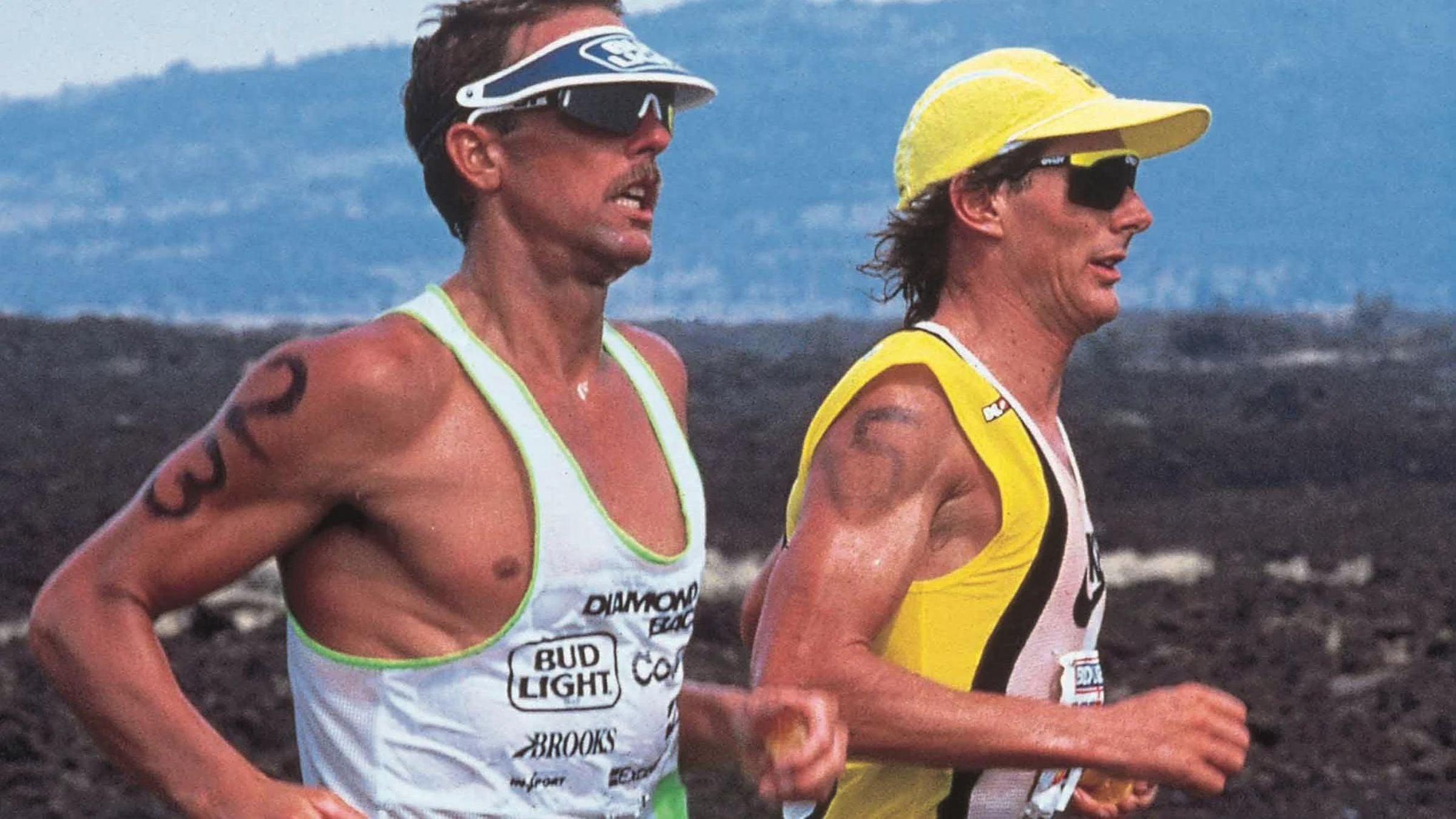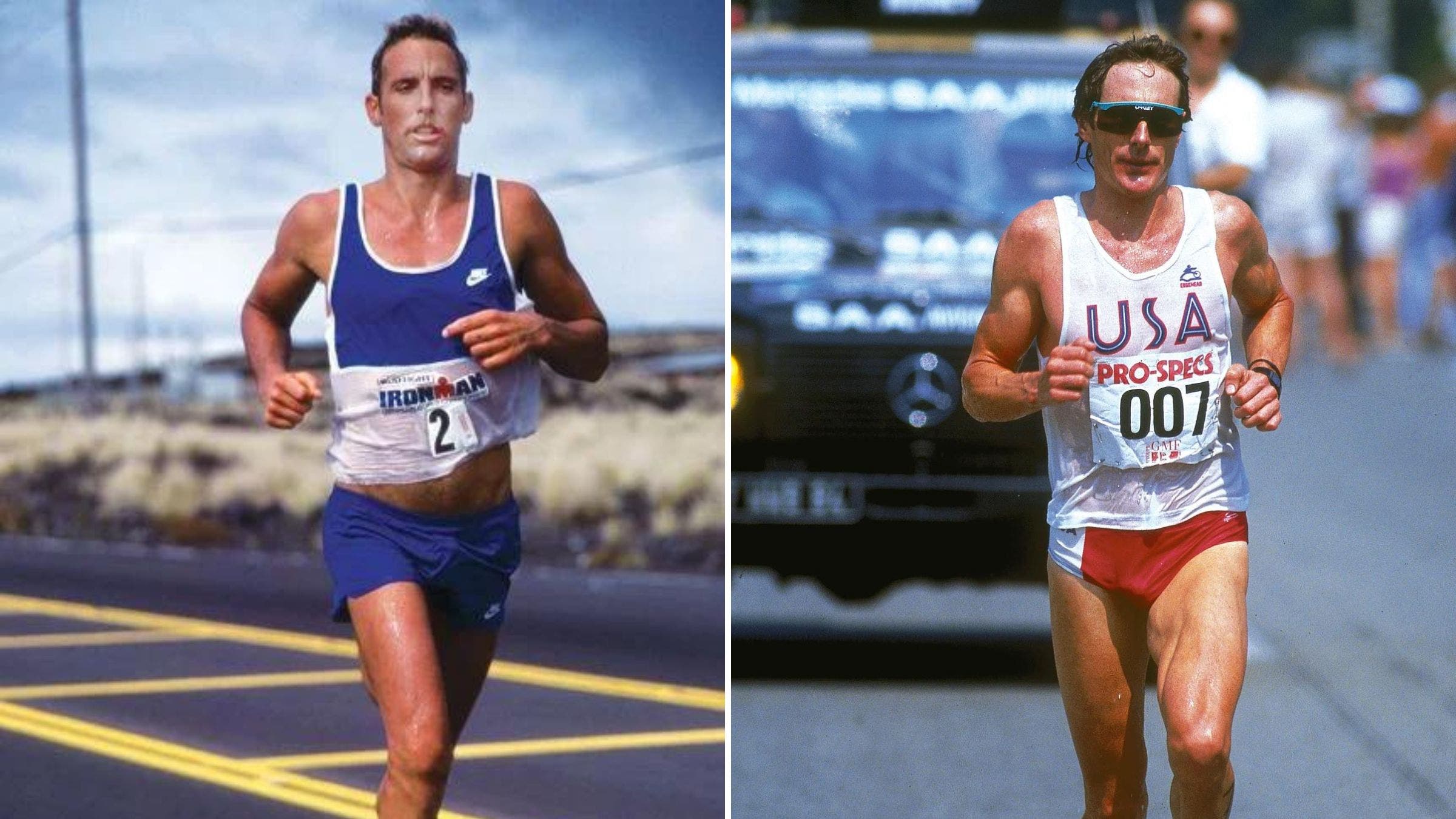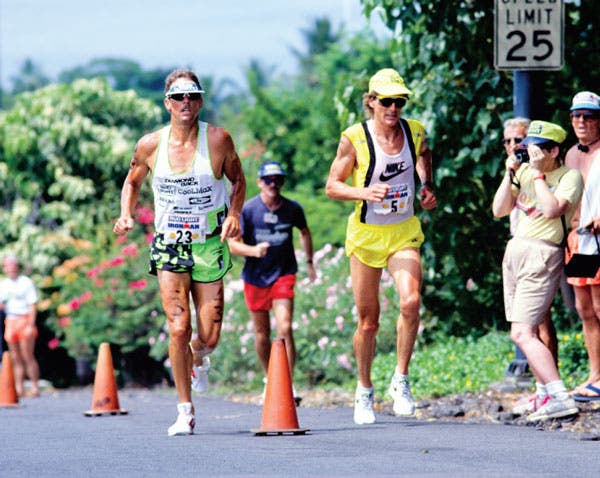What is Iron War?

(Photo: Lois Schwartz)
Often dubbed the “greatest race ever run,” Iron War is the name given to the epic duel that took place between Dave Scott and Mark Allen at the 1989 Ironman World Championship in Kona, Hawaii. The pair raced shoulder-to-shoulder at world-record pace for almost eight hours, with Allen ultimately taking victory by just 58 seconds (and setting a new course record) in a time of 8:09:15—a record that stood for three years before Allen shaved a few seconds off in 1992. The third-place finisher on that day in 1989, Greg Welch, was more than 20 minutes behind.
In our overview of Iron War, we’re going to not only look at the facts surrounding the race, but also the context before, during, and after—as well as hear the stories directly from Allen and Scott themselves, via audio interviews.
RELATED: How the Iron War Almost Never Happened
Iron War: The Characters

For students of the sport and fans of its history, it is perhaps the most famous and most talked-about Ironman race. The display of indomitable will and tenacity from two athletes at the very peak of their physical game, unrelentingly fighting it out for a world title and neither one willing to give an inch, is the type of action Hollywood script writers can only dream of. It generated a level of interest far beyond the circle of diehard fans who followed this tiny niche sport back then: Scott and Allen weren’t just rivals on the race course. They had developed an intense rivalry that extended well beyond it; they were arch nemeses who had opposing ways of being and entirely different approaches to and philosophies on life, training, and everything in between.
In the book Iron War, author Matt Fitzgerald described Allen as “what some might call a New Age spiritual type. He meditates and favors alternative medicine….Dave’s a good old-fashioned jock of the no-pain-no-gain school. He believes you win by outsmarting your competition in training and outsuffering it in races.”
Going into the 1989 race, Scott was by far the favorite, or at least had the more impressive of Ironman resumes. With six Ironman world titles on his scorecard already and a nickname of “The Man” (largely because of his dominance at the distance), he needed little introduction—and he’d handily defeated Allen, the more inexperienced long-course athlete at this point, every time he’d shown up on the Big Island. Yet as is often the case with the greatest sporting rivalries, both men had also developed a deep mutual respect for one another.
In Iron War, Fitzgerald said of their rivalry: “It’s not that Dave and Mark really hate each other. They just can’t like each other. Only one race matters, and only one man can win it. They’re like two ravenous tigers fighting over a kill. Dave was an Ironman legend before Mark even owned a bike. But the younger man was quickly dubbed his elder’s heir apparent. Dave resented it, and Mark knew it.”
RELATED: The Intense Workouts That Fueled The Iron War
Iron War: How It Played Out

On October 14, 1989, Allen and Scott were together exiting the swim (with Allen reportedly drafting Scott and tapping his toes for much of it), with only two men ahead of them (Wolfgang Dietrich and Rob Mackle). Out on the bike, again, it was Scott setting the pace, keenly aware that of the two men up the road, Dietrich was a strong rider and not someone he wanted to let get away. Allen has admitted that no one else was even on his radar, his goal was simple: never let Scott out of his sights. He remained behind him for much of the 112-mile ride, despite Scott putting in several efforts to get away. As had been the case all day, by the time they reached T2, there were still just mere seconds separating them.
Allen recalls that it was the opening miles of the 26.2-mile run where he realized they were running at a blisteringly fast pace, a pace he’s since called “insanity,” but he knew he had to stick with it, he was deferring to his elder to set the pace:
The two men have been asked if they ever exchanged words during the race, but save for three words: “That’s not fair,” they said no words were uttered during their eight-plus hours together (and these words came from Allen, after Scott’s then-wife appeared from the crowds with their newborn baby and ran alongside them for a few strides).
It was on the run course where their physical proximity had its greatest impact. As Allen said here, “neither us of wanted to give an inch:”
Scott was by far the more experienced athlete at this point in their respective careers and his race strategy differed greatly to Allen’s. He wanted no part in this “racing together,” as he put it:
Throughout the course of the marathon, Scott had been stronger on the downhills, Allen on the up. As they approached the last long climb on the run course (just beyond mile 23), Allen said he knew exactly the move he needed to make—in fact, before the race he had already envisaged this being the spot where he could make a race-winning move (on a section of the course that is now commonly referred to as “Mark and Dave Hill”). As Fitzgerald wrote in Iron War: “It could happen here. He (Allen) pictured himself running next to Dave in the race’s final moments and considered that, in such a scenario, this spot represented his last best chance to make a winning move.”
He did, of course, sprinting so hard he opened up a gap of about 20 yards over the course of 15 seconds. The elastic had snapped; Allen’s first Ironman world championship was his for the taking, and Scott’s impressive reign was over.
Allen’s finish time of 8:09:15 wasn’t just a new course record, it was also some 18 minutes faster than Scott had ever clocked. The two men had taken each other—and the sport of triathlon—to all-time new heights. Little did they know back then how far-reaching—and long-lasting—an impact their duel would have on the sport and so many of its fans and followers that, more than 30 years later, we’re still writing and talking about it.
RELATED: The 16 Greatest Triathletes of All Time
Can’t get enough Ironman World Championship coverage? Visit our Kona Hub for news, analysis, history, photo galleries, and so much more – new stories added daily from our team on the ground at the Big Island.